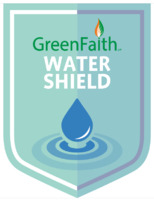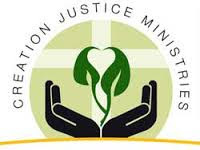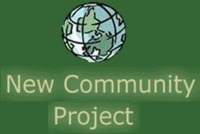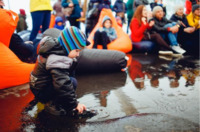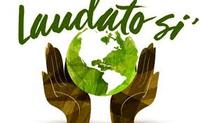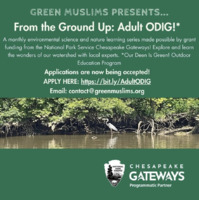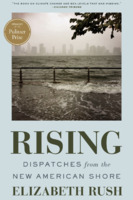Search
95 items
-
Muslims and Water Conservation
The United Nations recognizes World Water Day on March 22. The Muslim community is taking this message to heart with discussions of water conservation. The following excerpt provides a brief summary of the Muslim khutbah with regard to the topic of water scarcity:
"The purpose of today’s khutbah is to remind us that the conservation of water and more broadly environmental consciousness should be an integral part of what it means to be a conscientious Muslim. An environmentally conscious Muslim is someone who lives in reverence and harmony with nature and uses water and all other natural resources frugally and sparingly." -
Water Shield
Water Shield is a program hosted by GreenFaith that helps congregations learn how to conserve water as well as maintain high water quality. This program promotes stewardship, and can help gain a community recognition for their efforts in the environmental awareness world. Water Shield is an eco-merit badge that is bestowed upon faith-based institutions that have taken steps to conserve water, protect water quality, and mobilize its members and community to do the same at home. -
Changing the Columbia River Treaty
Many groups, including faith communities, have called for a restructuring of the Columbia River Treaty. The original treaty was written in 1964, and has become outdated. The people calling for the change want the river to be valued for its ecosystem services that were not included in the original treaty. -
World Help Providing Water for Kirinda, Uganda
World Help, a Christian organization, is raising money to provide clean drinking water to the people of Kirinda, Uganda. They are attempting to fund three major projects, a water well, piping, and irrigation. The lack of clean sources of water for the people who live here is causing diseases and additional hardships. -
A Sermon for World Water Day
Susan Barnett, founder of Faiths for Safe Water, brings attention to World Water Day by highlighting award-winning filmmaker and photographer, Haik Kocharian. Haik recently releasing, “Blessed by Water,” showing rare images of water in tradition, ceremony and spirituality as celebrated by the Christian Orthodox community in Ethiopia. Susan continues to discuss the concerns of clean water worldwide: 663 million men, women and children are forced to drink low quality water; and one third of the world's population don’t even have the dignity and safety of toilets. The article concludes by encouraging church leaders to use their collective voices to advocate for increased access to safe water and sanitation in order to improve global health, nutrition, poverty, gender equality, food security, human security, and peace. -
World Water Day Synopsis
The United Nations and the global community in general recognize World Water Day as a reminder that much of the world faces a global water, sanitation and hygiene crisis. 663 million people—comprising mostly the poorest and most marginalized in the world—live without access to safe drinking water. In addition 2.4 billion people lack access to improved sanitation. The article suggests various ways that individuals can contribute to improving the water conditions in these areas. -
Sustainable Weddings in Columbus
Weddings are typically large events to celebrate the union of two people. Regardless of how beautiful the celebration is, weddings can still generate a lot of waste. In fact, the average wedding can generate 500 pounds of trash. Recently, there has been a movement to have local sustainable weddings that cut environmental impacts significantly. -
Laudato Si’ in Columbus: Bishop Campbell Regales OSU Students with Historical Overview of Catholic Tradition
Bishop Campbell spoke to OSU students about Laudato Si', specifically regarding how Catholic tradition develops the context for it.
"Bishop Campbell highlighted four themes in his talk, including how Catholicism has considered nature for 2,000 years, a Catholic imagination of nature, historical trends of alienation from nature in the Western world, and a discussion of how sin – light and shadow of the world together – plays a role in our ecological situation."
Please click on the link below to view the entire article. -
WATERSHED: Replenishing Water Values for a Thirsty World
This site highlights the reports and videos and resources gathered to address world water resources, sponsored by the Vatican and many other partners. -
Christian Communities Respond to Trump’s Executive Order
President Trump signed an executive order on March 28 directing the EPA to review the Clean Power Plan. This executive order has the possibility to dismantle important climate change protections and fails to offer an alternative plan to protect our air quality and climate stability. Many Christian communities have responded to this action and made official statements on their thoughts and about protecting the Earth. -
Episcopal Diocese of Ohio: Bellwether Farm
Bellwether farm is a new camp and education center of the Episcopal Diocese of Ohio. It is meant to provide leadership development and teachings through sustainable farming, food production, and care of the environment. It is located in Wakeman Ohio, with the goals of informing, inspiring, and empowering leaders for a sustainable future. The buildings are models of green technology featuring passive buildings, renewable energy, and water reclamation systems. -
Church World Service to Withdraw from Paris Climate Agreement
Church World Service released a statement after the announcement that the United Stated will withdraw from the Paris agreement: “CWS strongly condemns President Trump’s decision to withdraw from the Paris Agreement. Coming at a time when the world is facing its largest humanitarian and refugee crisis since World War II, this decision will directly impact impoverished and vulnerable communities around the world and in the United States that are already facing the consequences of a changing climate.” -
New Community Project Creative Arts Page
The New Community Project created a creative arts page to offer resources for justice, peace, and care for creation. In the caring for creation section, there are skits, checklists, and worship resources all centered around this topic. -
A Hymn for Hurrican Relief
This article was written to showcase the hymn that was a tribute to prayers for the damage from the recent severe storms in Texas, Louisiana, Nepal, India, Bangladesh, the Caribbean, Florida, Georgia, and South Carolina. In addition to comforting those impacted by the storms, the hymn also serves as a message for government leaders to work for policies that help to counter climate change. -
Wade in the Water
Wade in the Water is a worship resource from the New Community Project. It calls for the stewardship of water and is a 20 minute worship service, including a hymn, about water as a precious resource. To read or download Wade in the Water, see below. -
Water Issues in Appalachia
Some people may think that water issues in the United States only exist in the west. This is far from the truth. In addition to algae bloom issues throughout the midwest, the Appalachian region of the United States has been experiencing severe water contamination due to mining and chemical spills for the past several years. Fortunately, the residents of this region are kept informed by the Catholic Committee of Appalachia. Once a year, residents from all over the state meet in one location to discuss the issues of their region and try to come up with solutions. -
The Sacredness of Water
This chapter from the student-written book “Emerging Perspectives on Religion and Environmental Values in America” explores the importance of water across religious traditions and modern life. It explores the importance of water for survival but also as a gift that frequently acts as a spiritual symbol. Below is the first paragraph of the chapter to introduce the discussion.
"Pick up any religious text and you are likely to find at least one reference to water. Whether it is used to cleanse, bathe, heal, restore, replenish, or purify: water is one of the most prolific symbols in major world religions, stretching through time, place, and culture. As human beings, this may come as no surprise seeing how our bodies are composed mostly of water, and we rely on it for our very survival – a truth that continues to become more resonant as the effects of climate change take hold in the forms of drought, rising temperatures, and natural disasters. Like many religious symbols, water appears in scripture, ritual and tradition through its simplicity and use in everyday life. In examining a variety of major world religions, namely Islam, Judaism, Hinduism and Christianity, connections between water as a common resource, and water as a sacred and holy gift become apparent. Drawing from these unique and similar understandings of water, we can begin to consider the spiritual motivations one might have in engaging in water conservation efforts. Furthermore, in exploring these religions specifically, we can identify some beliefs about water that may provide helpful wisdom in the face of more rational conversations surrounding water conservation. Because these religions have such strong relationships with water and large followings worldwide, there is hope that these connections between scripture and our contemporary crisis may be brought to life to move toward a more secure and just future." -
Scripture Sunday: Invitation to the Thirsty
"Walter Bruggeman has said that the task of the prophet is 'to nurture, nourish, and evoke a consciousness and perception alternative to the consciousness and perception of the dominant culture around us.' Here in Deutero-Isaiah, the Israelites who have been exiled are given a vision of hope, Isaiah is evoking a reality far different from what they know. In the previous chapter, God says, in one of my favorite verses, 'For a brief moment I abandoned you, but with deep compassion I will bring you back. In a surge of anger I hid my face from you for a moment, but with everlasting kindness I will have compassion on you… My unfailing love for you will not be shaken nor my covenant of peace be removed' (Isaiah 54:7-10). This is the climax of the second book of Isaiah, that God’s anger towards injustice and the consequences of it are momentary, but God’s compassion, love, and faithfulness are everlasting, something we can never be separated from. Isaiah 55 then flows into the specifics of that love. God’s invitation into divine care is one that freely gives water, food, and rest." -
A Bluer Theology: Protecting and Restoring God’s Marine Creation
"Blue Theology was founded in 2008 by Rev. Dan Paul and Rev. Deborah Streeter. Streeter coined the term “Blue Theology” as a theological approach that weaves together marine biology and Christian theology. Over the next few years, the Church, only blocks from the Pacific Ocean, began hosting weeklong groups to engage in learning-serving experiences with God’s marine creation. Over the last two years, Blue Theology Outposts have opened in Newport Beach, CA, Texas City, TX, and Beaufort, NC. The mission of the Blue Theology program is to provide learning and serving experiences in ocean conservation while fostering heart connections to the sea." -
Sacred Lands, Sacred Waters: Theological Reflections on This Sacred World
"The lands and waters of this world are sacred places. We know it when we rest in them and we know it from our sacred texts. As Christians, to see the world as creation is to see the world as sacred.
This resource includes theological reflections from Karyn Bigelow, Avery Lamb, Dr. Miguel A. de la Torre, Rev. Victoria Loorz, Rev. Dan Paul, and Rev. Dr. Randy Woodley.
This resource was originally published for Season of Creation 2022." -
Laudato Si’ -- On Care For Our Common Home
Laudato Si appears to be increasing interactions between environmental professionals and faith communities, and as such, is a very important document for all people to understand–not just Catholics! Roman Catholicism is the largest religious denomination in the world (1.2 billion). An encyclical is one of the most authoritative declarations that a Pope can put forth. Laudato Si is both a reflection of the larger moral and religious landscape of environmental values, and perhaps simply the most prominent such statement of values yet crafted. It is symbolic of this moment in time when religious and ethical voices are gaining currency in environmental thinking, regardless of any particular doctrine.
-
From the Ground Up: An Adult Outdoor Education Program
AKA Our Deen is Green! for Adults"We are happy to announce that applications are now being accepted for From the Ground Up: An Adult Outdoor Education Program (aka Our Deen is Green! for adults). This special program, funded by a grant from the National Park Service Chesapeake Gateways Office, will begin after Ramadan, in late April 2024, and continue into spring of 2025. It is a unique opportunity to become immersed in the various facets of ecology, environmental science, sustainability and stewardship. It will include monthly classes, mostly in-person and outdoors in parks and wildlife sanctuaries in DC, Maryland, and Northern Virginia, focused on specific aspects of and issues pertaining to our local region, the Chesapeake Bay Watershed.
Classes will be led by local subject matter experts and include a variety of topics, including local plants and animals, the interconnectedness of our watershed, the challenges it’s facing, and what we can do to help. Specific classes will include:
· An introduction to the Chesapeake Bay Watershed
· Local herps: reptiles and amphibians
· Monitoring stream health with benthic macroinvertebrates
· Stream restoration and invasive plant removal
· The importance of native plants and pollinator gardens
· Watershed education through an interfaith lens
· Native trees
· Soil health
· Environmental justice
· Local birds and “bugs”
· Solar power and clean energy
· Sustainable living
· Water-quality monitoring
· And more!
We are looking for 10-15 strongly committed local residents who are interested in learning about our local watershed, its needs, and what they can do to help it. Participants will be encouraged to create a long-term project or plan of action describing something they will do to support the watershed and/or encourage their families or communities to pay more attention to environmental issues.
Program participants must be able to commit to the majority of the monthly classes. All in-person classes will take place on weekends and last 2 to 4 hours. (We will do our best to help provide transportation if necessary.)
This entire program is being offered free of charge thanks to a National Park Service Chesapeake Gateways grant. The National Park Service Chesapeake Gateways Office (NPS Chesapeake Gateways) offers competitive grant opportunities to advance the Chesapeake Bay Initiative Act of 1998 within the full 41-million-acre Chesapeake Bay watershed. Chesapeake Gateways grants bring out familiar, untold, under-appreciated, or yet to be uncovered narratives and promote resilient communities & landscapes through tourism, sustainability, conservation & local economies throughout the Chesapeake Bay watershed.
The program begins after Ramadan, with the introductory class set for April 21st! Applications are due by March 8th. Access the application form below. Please reach out to us at contact@greenmuslims.org with any questions." -
Rising: Dispatches from the New American Shore
This resource contains a series of vignettes following Elizabeth Rush as she meets people all around American who have been affected in some way by global sea rising, as well as some of her own personal experiences. She gives voice to those otherwise not heard, and shares eye opening testimonials from those who experience the effects firsthand. -
A Walk with Sustainability…and the Bolivian Llamas
"In this picture, I am working alongside two rural Bolivian community members (and a llama), collaborating on the design of a water system. The community had no running water, phone service only on hills, cut plastic liter bottles in half for gutters, and still gave me soups and meals as a welcoming and thankfulness. Their kindness, harmony with the land around them, and joy radiated, deeply resonating with my idea of how to live a sustainable, happy life. Sustainability is not buying a reusable water bottle…every 3 months because a new, better, more cool version is here. It is living in gratitude and simplicity with the people and nature around you." Taken by Megan Oleksik. Submitted to the RESTORExchange Sustainability Contest. -
Capturing the Essence of Sustainability at Halifax Public Garden
"Capturing the essence of sustainability at Halifax Public Garden. This picturesque view of the tranquil lake connects the myriad benefits of green spaces, from promoting social connections and mental well-being to enhancing physical health and fostering equity within our communities to improving water and air quality. Serving as a reminder of the crucial role green spaces play in fostering sustainable communities. By preserving and nurturing our natural environments, we not only enhance our quality of life but also safeguard the health of our planet for future generations. Let's continue to embrace and support sustainability efforts for a greener, more resilient world." Taken by Aklema Iryn. Submitted to the RESTORExchange Sustainability Photo Contest.


